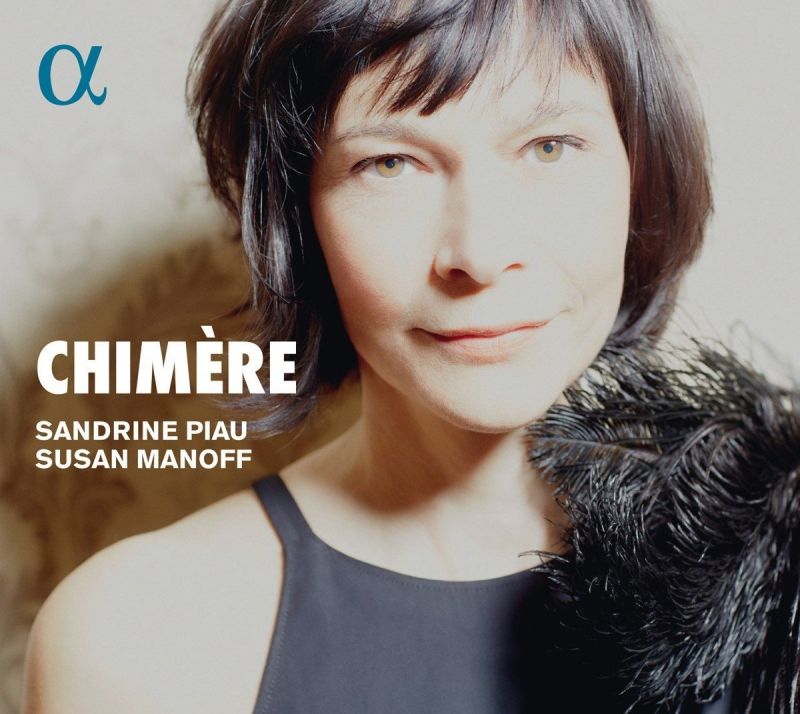Sandrine Piau: Chimère
View record and artist detailsRecord and Artist Details
Composer or Director: Ivor (Bertie) Gurney, Hugo (Filipp Jakob) Wolf, Robert Schumann, André (George) Previn, (Johann) Carl (Gottfried) Loewe, Samuel Barber, Francis Poulenc, Claude Debussy
Genre:
Vocal
Label: Alpha
Magazine Review Date: 07/2018
Media Format: CD or Download
Media Runtime: 58
Mastering:
DDD
Catalogue Number: ALPHA397

Tracks:
| Composition | Artist Credit |
|---|---|
| Ach neige, du schmerzenreiche |
(Johann) Carl (Gottfried) Loewe, Composer
(Johann) Carl (Gottfried) Loewe, Composer Sandrine Piau, Soprano Susan Manoff, Piano |
| Lieder und Gesänge aus Wilhelm Meister, Movement: No. 1, Kennst du das Land |
Robert Schumann, Composer
Robert Schumann, Composer Sandrine Piau, Soprano Susan Manoff, Piano |
| (5) Lieder und Gesänge, Movement: Dein Angesicht |
Robert Schumann, Composer
Robert Schumann, Composer Sandrine Piau, Soprano Susan Manoff, Piano |
| Myrthen, Movement: No. 7, Die Lotosblume (wds. Heine) |
Robert Schumann, Composer
Robert Schumann, Composer Sandrine Piau, Soprano Susan Manoff, Piano |
| Fêtes galantes, Set 1 |
Claude Debussy, Composer
Claude Debussy, Composer Sandrine Piau, Soprano Susan Manoff, Piano |
| Eichendorff Lieder, Movement: Verschwiegene Liebe |
Hugo (Filipp Jakob) Wolf, Composer
Hugo (Filipp Jakob) Wolf, Composer Sandrine Piau, Soprano Susan Manoff, Piano |
| Mörike Lieder, Movement: Nixe Binsefuss |
Hugo (Filipp Jakob) Wolf, Composer
Hugo (Filipp Jakob) Wolf, Composer Sandrine Piau, Soprano Susan Manoff, Piano |
| Mörike Lieder, Movement: Das verlassene Mägdlein |
Hugo (Filipp Jakob) Wolf, Composer
Hugo (Filipp Jakob) Wolf, Composer Sandrine Piau, Soprano Susan Manoff, Piano |
| Mörike Lieder, Movement: Lied vom Winde |
Hugo (Filipp Jakob) Wolf, Composer
Hugo (Filipp Jakob) Wolf, Composer Sandrine Piau, Soprano Susan Manoff, Piano |
| (5) Elizabethan Songs, Movement: Sleep |
Ivor (Bertie) Gurney, Composer
Ivor (Bertie) Gurney, Composer Sandrine Piau, Soprano Susan Manoff, Piano |
| Heart! we will forget him |
Robert Baksa
Robert Baksa, Composer Sandrine Piau, Soprano Susan Manoff, Piano |
| Banalités |
Francis Poulenc, Composer
Francis Poulenc, Composer Sandrine Piau, Soprano Susan Manoff, Piano |
| Solitary Hotel |
Samuel Barber, Composer
Samuel Barber, Composer Sandrine Piau, Soprano Susan Manoff, Piano |
| (3) Métamorphoses, Movement: C'est ainsi que tu es |
Francis Poulenc, Composer
Francis Poulenc, Composer Sandrine Piau, Soprano Susan Manoff, Piano |
| (3) Dickinson Songs |
André (George) Previn, Composer
André (George) Previn, Composer Sandrine Piau, Soprano Susan Manoff, Piano |
Author: Hugo Shirley
As before, the repertoire is eclectic and, also as before, Susan Manoff offers supremely sensitive and subtle piano-playing to complement singing of intense beauty: beguilingly gentle of timbre, Piau’s is a voice that can bloom sensuously at the top, and which she controls exquisitely. It’s a long time since I’ve heard a more purely gorgeous account of Wolf’s ‘Verschwiegene Liebe’, for example, and her performance of Gurney’s ‘Sleep’ took my breath away on first listening – and on subsequent listenings, for that matter – made all the more seductive by Piau’s slightly relaxed, tension-free (and pretty much accent-free) way of singing in English.
She and Manoff cast their spell right from the start, though, with a yielding and deeply touching account of Loewe’s ‘Ach neige’. The three Schumann songs left me longing for more – the performance of ‘Dein Angesicht’ is another highlight. Reviewing ‘Après un rêve’, Richard Wigmore drew attention to Piau’s less than ideally sharp consonants singing German, and it’s true that she could do more with some of the words here too (one notices a lack of definition in ‘Nixe Binsefuss’), but it seems a small price to pay for such musical and heartfelt performances.
There’s no such issue, of course, with Piau’s French, and she is by turns witty and seductive in Debussy and Poulenc. She’s terrific, too, in Robert Baksa’s ‘Heart! we will forget him’, Barber’s wonderfully subtle ‘Solitary Hotel’, as well as the Three Dickinson Songs by Previn that conclude the recital.
In short, though one might quibble with certain interpretative aspects of individual performances, this is one of the most fascinating, satisfying and moving recital discs to have come my way for some time. It’s beautifully recorded too.
Discover the world's largest classical music catalogue with Presto Music.

Gramophone Digital Club
- Digital Edition
- Digital Archive
- Reviews Database
- Full website access
From £8.75 / month
Subscribe
Gramophone Full Club
- Print Edition
- Digital Edition
- Digital Archive
- Reviews Database
- Full website access
From £11.00 / month
Subscribe
If you are a library, university or other organisation that would be interested in an institutional subscription to Gramophone please click here for further information.




